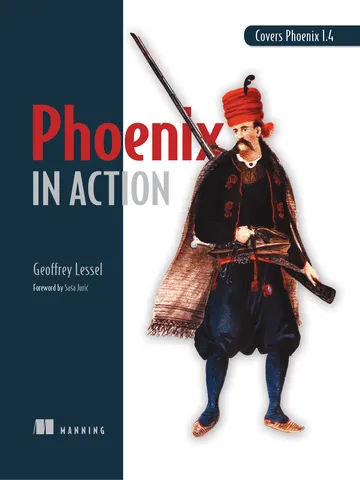Overview
1 Ride the Phoenix
Phoenix is a modern web framework that rides on the Elixir language and the Erlang VM to deliver real-time, resilient, and scalable applications on modest hardware. Instead of mimicking more prescriptive frameworks, it favors clear conventions without rigidity, letting teams compose services that are both fast and maintainable. The result is a practical toolset for everything from simple websites to globally distributed systems that stay responsive under load and recover gracefully from failure.
Several differentiators power this promise. Phoenix’s channels make soft real-time features—chat, live updates, collaborative UIs—straightforward by pushing only the changes users need. Under the hood, Elixir spawns lightweight, isolated processes by the thousands, so a single failure can’t cascade. Supervision trees restart crashed workers automatically, giving fault tolerance by design. Background tasks are trivial to offload without blocking users, and the BEAM VM efficiently utilizes all CPU cores while keeping memory usage low, enabling cost-effective scaling. These strengths have led companies like Pinterest, Slack, and Discord to adopt Elixir and Phoenix in critical paths.
Elixir itself is the engine behind Phoenix’s capabilities. Built on the decades-hardened Erlang VM, it offers massive concurrency, distribution across nodes, and hot-reload-friendly reliability. OTP provides robust patterns—servers, supervisors, worker pools—that solve common production problems consistently. Macros and metaprogramming make the language extensible without sacrificing clarity, and the ecosystem benefits from a strong emphasis on maintainability and readability.
Elixir’s functional nature complements web development needs: data is immutable, functions are pure, and side effects are minimized. Instead of objects that hide and mutate internal state, modules expose functions that transform data explicitly, producing code that’s easier to reason about, test, and parallelize. This predictable data flow is especially valuable in real-time and distributed contexts where correctness and resilience matter.
- Time to productivity: a learning curve exists if you’re coming from other paradigms or frameworks.
- Number crunching: not the fastest choice for heavy, low-level computation.
- Community and packages: smaller ecosystem than older, larger languages, though growing steadily.
- Deploying: tooling is improving, but the “one best way” is still maturing.
Taken together, Phoenix and Elixir offer a compelling blend of performance, reliability, and developer experience—ideal for modern, real-time, and distributed web systems—while acknowledging trade-offs that teams should weigh as they adopt the stack.
1.6 Summary
[1] The RaceCar.accelerate/1 syntax means the accelerate function inside the RaceCar module that has argument arity (the number of function arguments) of 1.
FAQ
What is Phoenix?
Phoenix is a web framework written in Elixir that helps you build and maintain dynamic websites and APIs. It runs on the Erlang VM, giving it battle-tested reliability and concurrency. Unlike some frameworks, it provides guidance without being overly prescriptive, so you can structure applications the way you prefer.How is Phoenix different from frameworks like Ruby on Rails?
Phoenix embraces functional programming and lightweight processes from Elixir/Erlang, which enables massive concurrency and fault tolerance out of the box. It’s less dogmatic about project structure, and it bakes in real-time features (like channels) that are harder to add elsewhere. The result is flexibility plus strong performance characteristics.What are Phoenix Channels and what can I build with them?
Channels enable soft real-time, server-push features with minimal effort. Common use cases include chat, live bidding and auctions, collaborative editing, dashboards, and multiplayer game updates. Because each channel runs in its own process, failures are isolated and scaling to many concurrent users is practical.How does Phoenix handle real-time “push” updates compared to traditional “pull” refreshes?
Traditional pull requires clients to ask the server for updates and often re-renders entire pages. With Phoenix, the server can push only the changed data to clients, reducing bandwidth and improving responsiveness. This approach shines on mobile and for large numbers of concurrent users.What makes Elixir’s processes so powerful for web apps?
Elixir processes are extremely lightweight and isolated, with unshared memory and fast message passing. Phoenix leverages them to spawn processes per connection or channel, allowing hundreds of thousands of concurrent connections on modest hardware. If a process crashes, others remain unaffected.What are supervision trees and why do they matter?
Supervision trees pair supervisors with workers to automatically detect failures and restart crashed parts of your app. You can configure restart strategies and nest supervisors, creating resilient, self-healing systems. This pattern simplifies building reliable, distributed services.Why is the Erlang VM important for Phoenix and Elixir?
The Erlang VM brings decades of production experience in low-latency, distributed, and fault-tolerant systems. It supports features like hot upgrades, robust error handling, and transparent distribution, all of which Elixir and Phoenix inherit. You can also call Erlang modules directly from Elixir.What is OTP and how does Phoenix benefit from it?
OTP is a rich set of libraries, behaviors, and standards for concurrency, fault tolerance, and distribution. It includes building blocks like supervisors, servers, worker pools, and load balancing strategies. Phoenix apps are OTP applications, so you naturally apply these patterns to web development.Can Phoenix run long tasks in the background without blocking users?
Yes. Elixir makes it trivial to start asynchronous tasks for long-running work, such as file processing or personalization after checkout. Your app can acknowledge user actions immediately while background processes complete and notify the user when ready.What are the main trade-offs of using Elixir and Phoenix?
- Time to productivity if you’re new to functional programming or the ecosystem
- Raw number-crunching performance lags low-level languages
- Smaller community and package ecosystem compared to giants like Python or Java
- Deployment tooling is improving but historically has been more involved
Despite these, many teams adopt Phoenix for real-time features, clarity, reliability, and low-cost scaling; companies like Pinterest, Slack, Discord, and others use Elixir/Phoenix in production, at times achieving sub-millisecond latencies and reduced server footprints. Phoenix in Action ebook for free
Phoenix in Action ebook for free